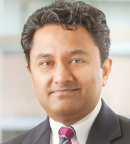The coronavirus-related pandemic has affected nearly every corner of the globe. What originated in one country is on course to likely affect every country in the world. In a few countries, the disease has peaked and is on the downward trend. In some, including the United States, the disease is on the ascent, with hope for an abbreviated peak and accelerated decline. In many others, it is too early to make an educated guess of the effects of this novel virus.

Chandrakanth Are, MBBS, MBA, FRCS, FACS
Several countries around the world are in varying stages of preparation to tackle the growing burden of the coronavirus disease (COVID-19). The preparations range from acknowledging the true potential of the disease and educating the public to marshalling the resources and might of local governments to protect the health and safety of their populations.
Each country is responding in its own way to help deal with COVID-19.
As oncologists and health professionals caring for individuals with cancer, we must ask ourselves, “How will this pandemic affect our patients?”
Impact on Cancer Care
Oncologists, for the most part, take care of older patients, as cancer still continues to be a disease of the elderly. Cancer is considered an age-related disease, with the incidence of most cancers rising with age.1 In addition, many patients with a cancer diagnosis are immunosuppressed, regardless of age, for various reasons. The coronavirus seems to have a predilection for elderly patients and patients who are immunosuppressed for any reason. In addition, patients with cancer are already at an increased risk for infection.2 All of these factors combined make patients with cancer more likely to be infected with COVID-19 and to have a higher mortality rate.
What can we oncologists do? The most accurate answer may only be known correctly sometime in the future—hopefully in the near future. However, we do need to act now, not only to take care of our patients with a known cancer diagnosis, but to also help all other patients as well, when possible.
What to Tell Patients
We need to remind our patients to be prepared, to be very prepared. We need to alert our patients of their higher risks, but at the same time reassure them of the reality of the situation and provide them comfort with our continued presence in their lives. We need to become the reliable source of a measured transfer of knowledge about the disease and its effects on their cancer diagnosis. Importantly, emphasizing the value of some simple but effective habits of personal hygiene that the immunosuppressed patient with cancer may already be doing, in addition to social distancing, will be most effective in protecting patients.
For those who have lived, trained, and worked in multiple health-care systems across the world, there is another major reason for solace and comfort that we can pass on to our patients. Our health-care system, despite all its imperfections, is still one of the best in the world. On top of all of this, we have the American spirit of giving and the resilient grit of not giving up. Short of a crystal ball, my experiences in the United States tell me that our health-care system and our health-care professionals are capable of handling this novel coronavirus head-on to reduce spread and minimize mortality. We will get through this health-care crisis as we have done in the past with other calamities.
If our patients need any more comfort in the capacity and resilience of our health-care system, we can provide reassuring data about their own disease: cancer. The death rate from cancer in the United States dropped by an enviably whopping 29% from 1991 to 2017.3 And we witnessed the largest 1-year drop of 2.2% between 2016 and 2017.3 We can reassuringly inform our patients that this same health-care system will be committed to take care of them if the need arises due to COVID-19.
Uncharted Terrain
Yes, there will be stumbles and very likely many of them, big and small, until this pandemic is under control. This is uncharted terrain for nearly everyone in the world, and many aspects of this entire virus, including its origin and lethality, are yet to be deciphered. However, our responsibility remains to take care of patients with cancer, and, as we always do, this will continue to be with a combination of the best-known evidence and compassion.
DISCLOSURE: Dr. Are reported no conflicts of interest.
REFERENCES
1. National Institutes of Health, National Cancer Institute: Age and cancer risk. Available at https://www.cancer.gov/about-cancer/causes-prevention/risk/age. Accessed March 14, 2020.
2. American Cancer Society: Infections in people with cancer. Available at https://www.cancer.org/treatment/treatments-and-side-effects/physical-side-effects/low-blood-counts/infections.html. Accessed March 14, 2020.
3. Simon S: Facts & figures 2020 reports largest 1-year drop in cancer mortality. American Cancer Society, January 8, 2020. Available at https://www.cancer.org/latest-news/facts-and-figures-2020.html. Accessed March 14, 2020.
Dr. Are is the Jerald L & Carolynn J. Varner Professor of Surgical Oncology & Global Health; Associate Dean for Graduate Medical Education (DIO); and Vice Chair of Education Department of Surgery, University of Nebraska Medical Center, Omaha.

